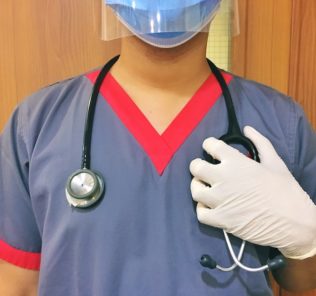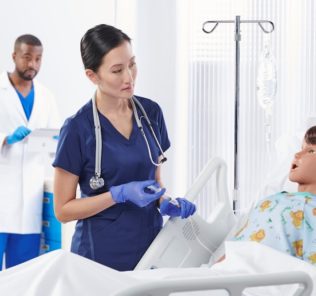Upcoming Healthcare Simulation Webinars to Improve Clinical Experiences
The HealthySimulation.com webinar platform “LEARN” hosts a number of informative healthcare simulation webinars each month. Today, the platform is hosting two healthcare simulation webinars developed to give simulationists an edge when designing clinical simulation experiences. This HealthySimulation.com article shares what participants can expect to take away from these presentations, including learning objectives. There’s still time to register – click on the webinar presentation title links to secure your spot!
November 22 at 9 AM PST, UTC-8 | Building Better Clinical Simulation Experiences Through Collaborative Cross Training
Presented by Beverly Price, BSN, RN, CHSOS, and Melissa Malone MSN, RN, GERO-BC, NPD-BC, this one-hour, intermediate healthcare simulation webinar presentation explains how cross-training educators and simulation techs can lead to better healthcare simulation program collaboration and improved medical simulation experiences. Within the healthcare simulation practice, operations and education are intertwined and simply cannot excel independently of one another.
Sponsored Content:
Simply put, a collaboration between the two roles is vital. An effective way to foster that collaborative mindset is to train both clinical educators and operations specialists on the basic functionality of high-fidelity manikins. A broader understanding of the human patient simulator functionality and operations allows an educator to increase realism and fully utilize the high-fidelity manikins, ultimately helping to meet clinical simulation learning objectives.
A discussion of instructional objectives with the operations specialist assists in the overall improvement of collaboration and the development of simulation activities. The presenters will discuss the creation and implementation of plans for departmental cross-training. Learning objectives include learning to:
- Identify one educator within your department that could participate in training in the role of operations
- Create a “next steps” plan for cross-training within the department.
- Identify key stakeholders in implementing a plan to train educators in the operations of simulation.
November 30 at 11 AM PST UTC-8 | Expand Your Healthcare Simulation Program by Building Relationships
Build and grow your healthcare simulation program by building relationships. Resources are invested in simulation programs and centers. Leaders anticipate and expect use, growth, and outcomes impacting patient care. One key practice to building simulation programs is building relationships. Intentionality with actionable relationship-building practices reaps great rewards in simulation program growth and development. In a three-year period, including COVID we experienced a 50% increase in learners through our simulation center. Consistent, intentional relationship-building practices were part of the successful growth strategy. Learning objectives include:
Sponsored Content:
- Identify the people you need to build relationships with.
- Proactively meet with people identified for relationship building.
- Affirm and celebrate those with whom you have built relationships.
December 1 at 9 AM PST UTC-8 | Simulating Medication Administration with a Real Pyxis MedStation
Why is the Pyxis MedStation ES so important for simulation programs to consider? World-renowned Clinical Simulation expert Pam Jeffries, Professor of Nursing and Dean of the School of Nursing at Vanderbilt University shares that “Simulations are a very important part of the program because of the immersion and experiential learning,” says. “Every simulation center today needs a Pyxis. That’s one example of the technology that’s needed to prepare our nurses not only for today but for tomorrow.”
This webinar will answer “What can the Pyxis platform offer my program in terms of teaching realistic medication administration?” Learn more in this webinar about the market leader in medication dispensing systems and how this technology can be used to educate clinical students on safe, patient-centered care. In partnership with Becton-Dickinson (BD), Medical Shipment is the sole provider of Pyxis MedStation products for educational programs. The Pyxis product line offers educators a customizable, scalable platform to train students on the same equipment they will later use in the hospital setting. Learning objectives include:
- Discuss the importance of Pyxis products in education.
- Learn about the user experiences for faculty and students.
- Identify which Pyxis products best fit your simulation goals.
December 1 at 11 AM PST, UTC-8 | Deconstructing Healthcare Silos: Multiplayer Virtual Reality for Interprofessional Education
Virtual reality (VR) is a tool that can shape the way we deliver experiential learning. Interprofessional education (IPE) training is crucial to developing collaborative team communication. However, finding adequate time and resources for simulation team training is challenging. The need to support alternative education delivery methods has never been more critical. Using a virtual environment for IPE training may allow for more frequent training opportunities with a diverse group of participants.
During this webinar, Dr. Brown will discuss her work with traditional single-player VR and a multiplayer VR platform that uses real-time voice communication between participants to allow for collaborative engagement and debriefing within the virtual space.
This CE webinar will provide a roadmap for the implementation and evaluation of virtual learning using simulation standards of best practice. Learning objectives include:
- Discuss the current literature related to VR and IPE in clinical simulation education and training.
- Describe the development of a multi-site collaboration using multiplayer VR for medical and nursing trainees.
- Discuss the findings from a multiplayer VR IPE pilot research study with a synchronized debriefing for clinical outcome improvement.
December 7 at 11 AM PST, UTC-8 | Leveraging Clinical Simulation Environments for Immersive Life-Long Clinical Learning
The rapid-fire changes confronting administrators, clinicians, and educators in the world of modern healthcare are numerous. As the workforce shortage deepens, developing and retaining existing personnel and efficient onboarding of new staff is critical. Effective clinical simulation programs expedite the onboarding of clinical personnel– but are also a powerful tool to identify and nurture core career paths within local and regional healthcare education and patient care ecosystems.
Institutional needs continue to evolve, with a growing array of live, virtual and remote instructional settings, following a strong shift to competency and confidence-based models of assessing clinical readiness. The rapid adoption of varied and siloed training tools has created a data storm and the urgent need for integrated, efficient, and scalable medical simulation training and monitoring tools. This webinar session will explore the array of training modalities and review the varied data sets that provide a full 360-degree view of learner performance, and competency and discuss the training models of the future. Learning objectives include:
- Employ effective simulation programs to expedite the onboarding of clinical personnel.
- Identify and nurture core career paths within local and regional healthcare education and patient care ecosystems.
- Adopt effective and scalable monitoring and competency tracking tools to accurately assess training performance.
December 8 at 11 AM PST, UTC-8 | Simulation Tools to Transform a
Team of Resuscitation Experts into an Expert Team
Cardiac emergencies are inevitable and challenging to prepare for, which contributes to the lack of improvement in resuscitation rates over the last decade. Join HealthStream & Format Health for a discussion on how to effectively incorporate a mobile cardiac arrest guidance and documentation system into your simulation training strategy. In this webinar, we will review the latest resuscitation support technology available, how to enhance team performance while promoting proper technique, and how to effectively integrate support technology into your simulation training. Learning objectives include:
- Understand basic prerequisites for effective Code Blue team simulations.
- Evaluate how a mobile support system can improve debriefing, quality of care, and accurate hand-offs to next-level care during simulation training.
- Review best practices for simulation training to increase your team’s adherence to ALS guidelines for improved response consistency & communication.
December 14 at 9 AM PST, UTC-8 | Healthcare Simulation Debriefing Strategies & Courses from Top Experts at The Debriefing Academy
Presented by Adam Cheng, MD, this one-hour, beginner webinar will provide key strategies for effective clinical simulation debriefing from world-renowned experts, as well as share more about Debriefing courses available from The Debriefing Academy. This webinar is designed to share more about the Master Debriefer Course, which provides the advanced content, strategies, and tools necessary to support the development of simulator educators within your program. Learning objectives include:
- Describe the journey of debriefing professional development as it relates to skill acquisition and evolving expertise.
- Identify five strategies simulation programs can use to help build simulation educator skills within their program.
- Summarize opportunities for simulation educators to improve their debriefing expertise through offerings from The Debriefing Academy.
December 15 at 9 AM PST, UTC-8 | New Armando IV Injection Training Arm and Nursing Skills Task Trainers from Remedy Simulation
Presented by Scott Wilson, this one-hour, beginner webinar will demonstrate the latest clinical skills task trainers from Remedy Simulation including the Armando IV / Injection Training and Nursing Skills Task Trainers Kit, as well as announce a new partnership with Wallcur. To help provide clinical simulation educators with all the resources needed Remedy Simulation Group has developed and released a Nursing 101 Training Kit, which will also be covered in this webinar This specially packaged kit was assembled with help from their University and Simulation Lab partners to address your simulation labs core needs. This kit includes everything needed to aid in the training of Injection, IV administration, Venipuncture, Catheterization, Diabetic Testing and Wound Care Dressing. Remedy Simulation will also make an important announcement in this webinar about its new distribution partnership with simulated medications company Wallcur. Join us for this one hour product demonstration webinar with key features discussed and product use cases! Learning objectives include:
Learn more about the Armando IV/Injection Training Arm and the Nursing 101 Clinical Skills Training Kit from Remedy Simulation Group.
Understand the opportunity to train nursing students with the latest innovative task trainers.
See Remedy Simulation Group product demonstrations from an actual clinical educator.
December 15 at 11 AM PST, UTC-8 | Reflection Through Art: Creative Ways to Use Neurographica in Clinical Simulation
Neurographica was developed by Dr. Pavel Piskarev in Russia, which is an art form that helps overcome emotions and limiting beliefs that combine art and psychology. The word Neurographica comprises two words: neuron and graphics, or drawing. This method can be used with complex clinical simulation cases where participants are left with many emotions. The more we draw, the more we expand our neuronal connections to be able to evolve internally, process our feelings, and to be able to transform our thinking. This webinar will consider ways we can incorporate art into our clinical simulation participant reflections. Learning objectives include:
- Learn how to effectively debrief clinical simulation with artistic mediums, such as neurographica.
- Practice utilizing the neurographica algorithm to provide reflective thinking.
- Consider ways art forms such as neurographica can be utilized to overcome clinical simulation learner-limiting beliefs.
More About HealthySimulation.com Webinars
HealthySimulation.com’s streamlined clinical simulation webinar platform relaunched in February, and has since featured even more informative and insightful healthcare simulation presentations! These webinars offer live and on-demand content from some of the world’s leading healthcare simulation experts, covering everything necessary to successfully start, develop or expand a clinical simulation program.
Topics range from safe medication administration to moulage and manikin functions. Many HealthySimulation.com webinar presentations are recorded and viewable from anywhere at any time. By registering to watch one or all of these webinars, simulationists, and learners have the opportunity to listen to and learn from various leaders across the clinical simulation industry.
Learn More About Upcoming Clinical Simulation Webinars
Lance Baily, BA, EMT-B, is the Founder / CEO of HealthySimulation.com, which he started in 2010 while serving as the Director of the Nevada System of Higher Education’s Clinical Simulation Center of Las Vegas. Lance also founded SimGHOSTS.org, the world’s only non-profit organization dedicated to supporting professionals operating healthcare simulation technologies. His co-edited Book: “Comprehensive Healthcare Simulation: Operations, Technology, and Innovative Practice” is cited as a key source for professional certification in the industry. Lance’s background also includes serving as a Simulation Technology Specialist for the LA Community College District, EMS fire fighting, Hollywood movie production, rescue diving, and global travel. He and his wife live with their two brilliant daughters and one crazy dachshund in Las Vegas, Nevada.
Sponsored Content:

















